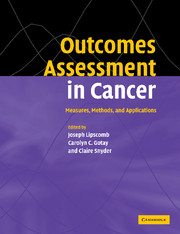Book contents
- Frontmatter
- Contents
- List of contributors
- Acknowledgments
- 1 Introduction to Outcomes Assessment in Cancer
- Health-related quality of life in cancer: general concepts and generic measures
- Assessing health-related quality of life during treatment
- Assessing health-related quality of life across the cancer continuum
- Measuring the experience and needs of cancer patients and caregivers
- Methodological considerations in applications to cancer outcomes research
- Modern psychometric theory in cancer outcomes research
- Assessing the economic impact of cancer
- Research and policy implications
- Invited papers
- Invited Paper A The world of outcomes research: yesterday, today, and tomorrow
- Invited Paper B The ten Ds of health outcomes measurement for the twenty-first century
- Invited Paper C The use of cognitive interviewing techniques in quality of life and patient-reported outcomes assessment
- Invited Paper D Industry perspective regarding outcomes research in oncology
- Index
- References
Invited Paper A The world of outcomes research: yesterday, today, and tomorrow
Published online by Cambridge University Press: 18 December 2009
- Frontmatter
- Contents
- List of contributors
- Acknowledgments
- 1 Introduction to Outcomes Assessment in Cancer
- Health-related quality of life in cancer: general concepts and generic measures
- Assessing health-related quality of life during treatment
- Assessing health-related quality of life across the cancer continuum
- Measuring the experience and needs of cancer patients and caregivers
- Methodological considerations in applications to cancer outcomes research
- Modern psychometric theory in cancer outcomes research
- Assessing the economic impact of cancer
- Research and policy implications
- Invited papers
- Invited Paper A The world of outcomes research: yesterday, today, and tomorrow
- Invited Paper B The ten Ds of health outcomes measurement for the twenty-first century
- Invited Paper C The use of cognitive interviewing techniques in quality of life and patient-reported outcomes assessment
- Invited Paper D Industry perspective regarding outcomes research in oncology
- Index
- References
Summary
This paper presents an informal look at some of the peaks and valleys of the past, present, and future of outcomes research. It is not intended to be a comprehensive history or summary of the subject, but it describes some highlights of this important area. Additional details can be found in the book Quality of Life and Pharmacoeconomics in Clinical Trials.
One of the overall themes over the last 25 years is the progress from considering patient satisfaction to a more careful evaluation of functional states, which in turn led to the use of scales and instruments for evaluating quality of life. Because of the various types of quality of life, this term evolved, in turn, to become health-related quality of life. In recent years, the umbrella term “patient-reported outcomes” (PROs) has become accepted and is becoming widely used to describe this field. PROs cover a continuum from patient satisfaction through measures of functional states through health-related quality-of-life assessments. The terminology has been standardized by a PRO harmonization group, composed of academic, government, and industry members of various trade associations, professional societies, and government agencies (European Regulatory Issues on Quality of Life Assessment [ERIQA], International Society for Pharmacoeconomics and Outcomes Research [ISPOR], International Society for Quality of Life Research [ISOQOL], and the Pharmaceutical Research and Manufacturers of America [PhRMA] Health Outcomes Committee, plus Food and Drug Administration [FDA] observers). Their report is available on-line at www.mapi-research-inst.com.
- Type
- Chapter
- Information
- Outcomes Assessment in CancerMeasures, Methods and Applications, pp. 584 - 589Publisher: Cambridge University PressPrint publication year: 2004
References
- 1
- Cited by



